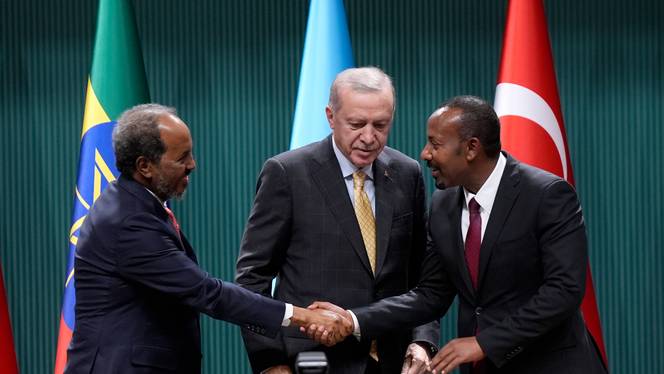Escalating tension between Ethiopia and Somalia seems to have ended—at least for now—following Türkiye-mediated talks in Ankara.
Ethiopian Prime Minister Abiy Ahmed and Somali President Hassan Sheikh Mohamud flew to the Turkish capital for the deal. And the Declaration was signed on Wednesday.
The President of Somalia has been adamant about peace talks with Ethiopia to ease tensions, demanding the nullification of the Memorandum of Understanding the latter signed with Somaliland—which is believed to be the immediate cause of the tension between the two countries.
What is known about the latest agreement in Ankara comes from the Ankara Declaration, which the two parties released after the talks.
“The meeting, held in a cordial atmosphere, enabled a frank and constructive discussion,” reads the declaration, which was published on the Republic of Türkiye Ministry of Foreign Affairs website.
It was stated in the declaration that “The Leaders of Somalia and Ethiopia reaffirmed their respect and commitment to one another’s sovereignty, unity, independence, and territorial integrity, as well as the principles enshrined in international law, the Charter of the United Nations, and the Constitutive Act of the African Union.”
The two countries have also agreed to leave behind what the declaration described as “differences and contentious issues” and to cooperate for shared prosperity.
After the Memorandum of Understanding between Ethiopia and Somaliland, Somalia had been engaged in sabotaging Ethiopia politically and militarily, including by entering into a military pact with Egypt, with whom Ethiopia has had a hostile relationship for a long time.
In September this year, Egypt shipped two vessels of firearms, including heavy weaponry, to Somalia. It was also poised to send 10,000 troops to Somalia as part of the African Union Peacekeeping Mission and a bilateral arrangement with Somalia. Recently, Somalia announced that Ethiopia would not be part of the peacekeeping mission once the existing mission ends at the end of this month. Somalia had also been downplaying Ethiopia’s decades-old peacekeeping mission in the country, during which tens of thousands of Ethiopian forces lost their lives. In the Ankara Declaration, “Somalia recognizes the sacrifices of Ethiopian soldiers within the African Union Missions.”
The two countries are also to resume economic relations. This is specified in the declaration: “They further agreed to closely work together to finalize mutually advantageous commercial arrangements through bilateral agreements, including contract, lease, and similar modalities, which will allow the Federal Democratic Republic of Ethiopia to enjoy reliable, secure, and sustainable access to and from the sea, under the sovereign authority of the Federal Republic of Somalia.”
Somalia and Ethiopia are to start technical negotiations to implement the declaration as early as February 2025.
Türkiye sees itself in a sort of monitorial role in all this. The declaration includes a statement supporting its role: “They [Ethiopia and Somalia] welcomed Türkiye’s assistance in the implementation of these commitments and pledged to resolve any differences concerning their interpretation and application through dialogue and in a peaceful manner with Türkiye’s support, as needed.”
The full version of the declaration is available on Turkey’s Ministry of Foreign Affairs Website.

